Essential Strategies to Keep Squirrels Out of Your Garden
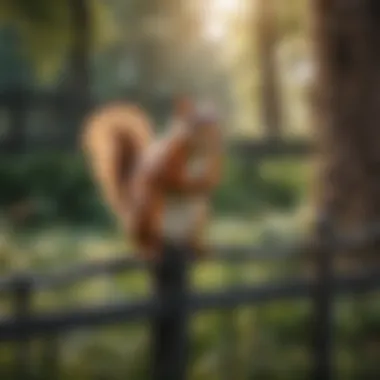
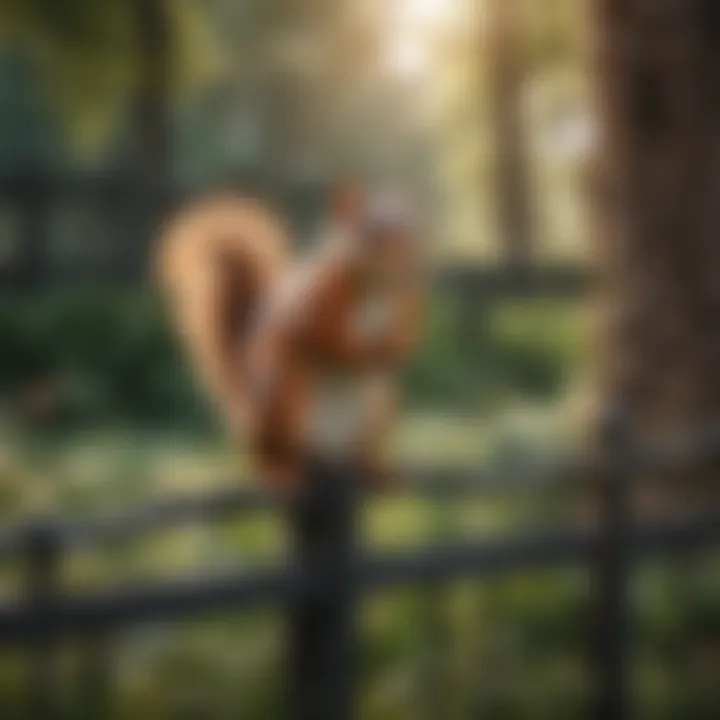
Intro
Many garden enthusiasts find themselves in a constant battle against squirrels, those seemingly adorable yet persistently troublesome critters. While they can be fun to watch from a distance, their scavenging habits can wreak havoc in gardens, leaving plants trampled or depleted of fruits and vegetables. To develop effective strategies for keeping these creatures at bay, it helps to understand their behaviors and preferences. This article blends practical advice with insights into squirrel behavior, arming you with the knowledge to protect your garden space.
By employing a combination of physical barriers, natural repellents, and environmental tweaks, anyone can create a garden that is less appealing to these furry invaders. Whether you're a pet owner, a dedicated gardener, or just someone looking to enjoy a peaceful outdoor space, implementing these strategies can help you maintain your green paradise without the unwelcome intrusion of squirrels.
Understanding Squirrel Behavior
Before laying out the various deterrents, it's crucial to grasp why squirrels are drawn to your garden in the first place. They’re opportunistic feeders, with a keen eye for anything that resembles food. Squirrels are known to be highly agile and can easily reach locations that other animals might struggle with. They’re also persistent and smart, often figuring out how to bypass simple barriers. Thus, understanding their habits can give rise to more tailored preventive measures.
Squirrel Attraction
Squirrels are attracted to a variety of plants, particularly fruits, nuts, and vegetables. If you have a garden filled with these delicacies, it’s like setting out a buffet just for them. Additionally, gardens with established bird feeders can inadvertently invite squirrels, as they tend to linger around areas with easy access to food. To successfully deter these critters, you must first identify what they are after in your garden.
Strategies for Prevention
Below, we break down multiple strategies that can effectively help in preventing squirrels from raiding your garden. These methods can be mixed and matched according to your specific needs and circumstances.
Physical Barriers
Creating physical barriers can be one of the most direct ways to discourage squirrels. Fencing, netting, and plant covers can keep them at bay. It is recommended to:
- Install a Strong Fence: Use a fence that is at least four feet tall. To be more effective, bury the bottom portion about a foot underground to deter them from digging underneath.
- Netting: Cover plants with bird or garden netting. This provides a physical barrier while still allowing plants to get light and rain.
- Plant Cages: For individual plants, wire cages can be a practical option, especially when protecting delicate seedlings.
Natural Repellents
Another approach is leveraging natural calming repellents. There are several methods you can use to make your garden less inviting:
- Spicy Solutions: Spraying a mixture of water and cayenne pepper around plants can deter squirrels. The spice doesn’t harm the plants but certainly makes them less palatable.
- Essential Oils: Oils such as peppermint or garlic can be effective. Soaking cotton balls in these oils and strategically placing them around your garden may help in keeping squirrels at a distance.
- Scents They Dislike: Squirrels are known to shy away from strong scents like vinegar or ammonia. Spraying these substances around the garden can create a less inviting atmosphere.
"Having a well-maintained garden is not just about the plants; it’s about creating a space that yields enjoyment with minimized disruptions from pests."
Environmental Modification
Sometimes, it's not about adding more deterrents but modifying your space to make it less appealing:
- Remove Food Sources: Regularly check for fallen fruits and nuts that attract squirrels to your space. Keeping the area clean goes a long way.
- Time and Maturity: Timing your planting can also make a difference. If you plant during winter, when food sources are scarce, you may experience less squirrel activity initially.
- Disguise: Consider planting less attractive species mixed in with your more vulnerable plants.
Community Insights
Learn from fellow gardeners who have faced similar challenges. Engaging with local gardening communities (like forums on reddit.com or groups on Facebook) can provide user-submitted tips and tricks. Their real-life experiences can often highlight unique methods that worked in specific situations, which might resonate with your own gardening circumstances.
These strategies, tailored to your garden's unique environment and your personal habits, can help you mitigate the persistent danger of squirrel invasion. In the following sections, we will delve deeper into specific techniques and real-world applications of these ideas.
Identifying the Threat: Understanding Squirrel Behavior
Understanding the behavior of squirrels is a crucial first step for homeowners wanting to protect their gardens. Many people see squirrels as harmless creatures darting around at parks or scavenging for seeds. However, these nimble little animals are experienced thieves when it comes to your plants and produce, especially fruits and nuts. By identifying the patterns in their behavior, you can come up with better strategies to deter them from invading your garden space.
Taking the time to explore their natural habits and preferences can lead to informed decisions, ultimately making every gardener’s efforts more fruitful and satisfying. Not only does comprehending squirrel behavior help in selecting effective deterrents, but it also informs you about when to watch for activity, ensuring that your defenses are in place before they strike.
The Natural Foraging Habits of Squirrels
Squirrels are primarily foragers with an insatiable appetite for a variety of seeds, nuts, and fruits. They have a knack for spotting tasty treats, thanks to their keen eyesight. Often, they will bury food to store for later, making them even more determined to find the next meal.
To better understand how to deter them, consider the following key foraging habits:
- Curious Explorers: Squirrels are highly curious by nature. Foraging isn’t just about food; it’s also an exploration. They often try to find new food sources and will dig around or chew through barriers to get what they want.
- Seasonal Choices: Their diet can change with the seasons. In spring and summer, they become more attracted to ripe fruits and tender vegetables, while autumn sees a heightened interest in seeds and nuts.
- Memory Masters: Squirrels are known to remember the locations of their buried food, which is vital for their survival. This memory also means they may return to the same spots if there are abundant food sources.
Getting familiar with these habits can help gardeners identify vulnerable times when squirrels might become more active, and tailor their defensive measures accordingly.
Factors that Attract Squirrels to Gardens
Gardens can become a veritable buffet for squirrels. It's not just the tempting fruits and vegetables that lure these furry marauders; there are numerous other factors that make gardens attractive to them:
- Accessible Food: Leftover seeds, fallen fruits, and unattended gardens filled with ripe vegetables can draw squirrels like moths to a flame. It’s vital to keep the area tidy and remove any abandoned leftovers.
- Shelter and Nests: Squirrels look for safe havens to nest, and gardens that provide bushes or trees might make a cozy spot. Thus, removing unnecessary cover can discourage them from sticking around.
- Water Sources: Like any other creature, squirrels need water. Accessible bird baths or small ponds can entice them further.
- Favorable Neighboring Environment: If nearby trees produce abundant fruits or nuts, squirrels are likely to venture to adjacent gardens. Keeping that in mind, it's important to factor in the overall landscape when addressing potential invasions.
Physical Barriers: Building a Fortress for Your Plants
When it comes to keeping your garden safe from unwelcome squirrel visitors, building physical barriers stands as one of the most effective strategies. Squirrels, naturally agile and crafty creatures, will stop at nothin’ to feast on your precious plants. By erecting fortifications, you can not only deter their foraging habits but also provide your garden with a statement of care and resilience.
Physical barriers serve multiple purposes: they act as deterrents, protect your plants, and can enhance the aesthetic of your garden space. Choosing the right type of barrier, understanding its construction, and placing it wisely are crucial steps in this endeavor. When done correctly, these barriers can minimize squirrel interference, ensuring your garden flourishes.
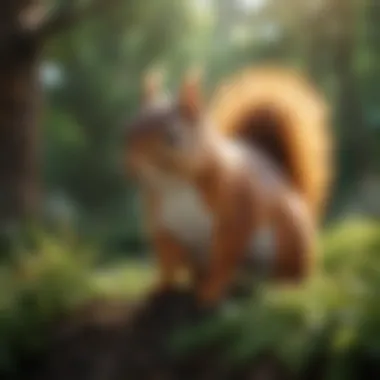
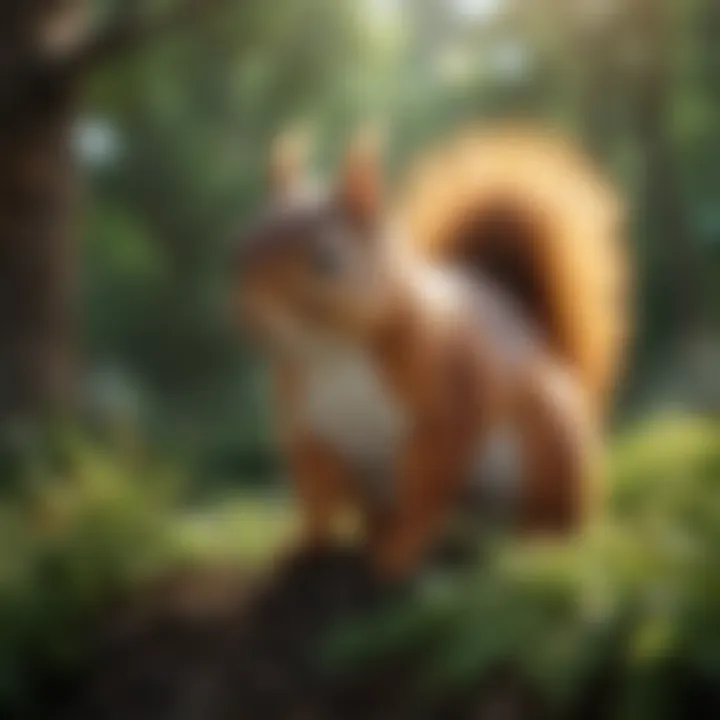
Constructing Fences to Keep Squirrels Out
Fences are often the first line of defense in warding off squirrels. A well-constructed fence can deter these pests and prevent them from entering your garden. To be effective, the fence should be tall enough (at least four feet) and buried about a foot underground to stop digging. Using materials like chicken wire or hardware cloth is common. These have a tight weave, making it difficult for squirrels to squeeze through.
It's important to consider the design too; a fence that tilts outward at the top can prove even more effective, as squirrels, being natural climbers, will find it hard to scale. A creatively designed fence can also complement the overall look of your garden while serving its protective purpose.
Using Netting to Protect Specific Areas
Netting is another useful tool when it comes to protecting individual plants or sections of your garden. It acts as a physical barrier while allowing sunlight and rain to reach the plants. Choosing the right netting is critical; opt for a mesh netting of smaller size to prevent squirrels from getting through.
Place the netting over the selected areas and secure the edges to the ground or surrounding elements to eliminate any gaps. This method is particularly useful for young plants or fruiting vegetables, which are prime targets for squirrel foraging. The drawback? If not checked regularly, netting can sometimes entangle or harm small animals, so it’s crucial to monitor its condition.
Innovative Garden Designs that Deter Squirrels
When it comes to protecting your plants, innovative garden designs can serve as a dual solution by deterring squirrels and enhancing your outdoor space.
Raised Beds
Raised beds have gained popularity for their ability to create a barrier that naturally uplifts your plants away from the ground, where squirrels typically roam. The height of raised beds not only makes it physically more challenging for squirrels to dig into the plants but also provides ease for the gardener.
A key characteristic of raised beds is their ability to promote better drainage and soil warmth, which can boost plant health. However, it’s worth noting that if a squirrel is particularly determined, it may still attempt to access the plants by jumping from nearby structures.
Vertical Gardens
Vertical gardens represent another innovative design approach that can help keep squirrels at bay. By growing plants upward instead of horizontally, you not only save space but also reduce the accessibility for squirrels. These gardens can be made using wall planters, trellises, or even repurposed materials to create stunning visual displays.
A unique feature of vertical gardens is their diversification in plant types, which can provide a buffet for the gardener while maintaining a barrier that squirrels find harder to penetrate. However, keep in mind that this method may require more maintenance, especially in terms of watering and ensuring support structures are sound for the plants.
In essence, implementing physical barriers to safeguard your garden against squirrels is not just a practical necessity; it also invites creativity into the crafting and design of your outdoor space. By utilizing fences, netting, and innovative designs like raised and vertical gardens, you can lower the risk of squirrel invasions and cultivate an ecosystem that thrives.
Natural Repellents: Harnessing Botanical Solutions
In the quest to keep squirrels at bay, natural repellents offer an appealing solution that aligns well with the ideals of a sustainable garden. Rather than resorting to harsh chemicals, which can potentially harm pets and the environment, one can explore botanical options that deter these pesky critters. This section zeroes in on specific plants that squirrels are known to shy away from, alongside some tried-and-true homemade recipes that can be readily made at home.
Plants that Squirrels Avoid
Certain plants possess properties that squirrels find off-putting, serving as excellent companions to those delicate garden treasures that we work so hard to cultivate. For instance, plants such as daffodils and hyacinths not only add aesthetic beauty but also contain chemicals that are toxic to squirrels. This means that their mere presence can provide a deterrent effect in your garden space. In addition, rosemary, with its strong scent, and lavender, known for its fragrant oils, can also make your garden less attractive to these nimble creatures.
Here are a few plants known to keep squirrels away:
- Marigolds: The scent is nothing short of a nuisance for squirrels.
- Nasturtiums: Besides being vibrant, they add a layer of deterrence against squirrels.
- Coleus canina (Scaredy Cat Plant): Known for its unique odor that repels both cats and squirrels.
Integrating these plants into your garden not only beautifies your space but simultaneously acts as a guard against unwanted visitors. You could think of it as having a natural security system embedded right into your garden!
Homemade Repellent Recipes
If you prefer to get your hands dirty mixing things up in the kitchen rather than replanting your garden, consider crafting your own squirrel repellent. Two particularly effective concoctions are Chili Pepper Spray and a Garlic and Vinegar Mixture.
Chili Pepper Spray
One of the most effective deterrents, Chili Pepper Spray, plays into squirrels’ aversions perfectly. The capsaicin found in chili peppers is known to irritate the taste buds and repulse squirrels when they munch on garden vegetation.
To make it, simply combine:
- 1 cup of water
- 2 tablespoons of crushed chili peppers
- A few drops of dish soap (to help it stick)
Mix these ingredients in a spray bottle, shake well, and then spray generously on the plants you want to protect. The beauty of Chili Pepper Spray is its ability to act swiftly. Just be cautious; it’s advisable to reapply it after rain or watering your plants.
However, note that the heat can affect beneficial insects as well, making usage a tad tricky for gardens already teeming with life.
Garlic and Vinegar Mixture
The Garlic and Vinegar Mixture doubles as a pungent guard against squirrels. The smell itself is a strong deterrent, making your garden an unwelcome place for these rodents. This recipe marries two powerful ingredients: garlic, known for its intense aroma, and vinegar, which amplifies the scent and adds a sharpness that squirrels dislike.
To create this mixture, follow these simple steps:
- 4 cloves of garlic (crushed)
- 1 cup of vinegar (preferably white or apple cider)
- 3 cups of water
Boil the garlic in the vinegar solution for about 10 minutes, let it cool, and then strain it into a spray bottle. Use this concoction on your garden plants as a protective barrier. Its unique feature lies in its strong odor which is effective in preserving your garden space.
Keep in mind that, similar to the chili spray, this mixture might repel more than just squirrels. A little trial and error might be necessary to find a balance that works well for both your plants and your surrounding environment.
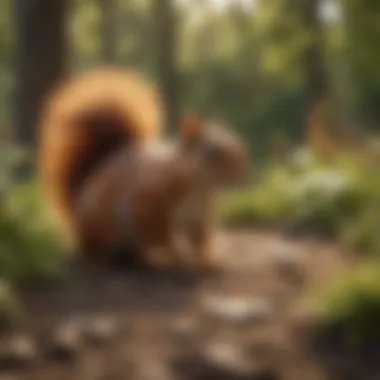
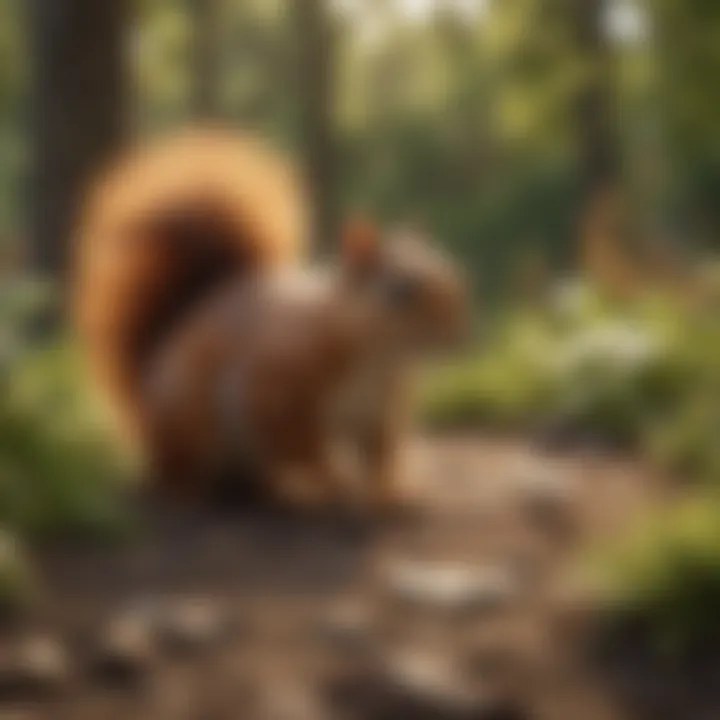
"Natural repellents embody a balanced approach to garden maintenance. They invite biodiversity while tending to our own gardening needs."
Through these strategies, you not only mitigate the risk of squirrel invasions but also cultivate an engaging and eco-friendly space. Remember, healthy gardens radiate vitality, a quality that squirrels often avoid.
Chemical Repellents: Commercial Solutions
When it comes to keeping those pesky squirrels at bay, commercial repellents can be a game-changer for many gardeners. These products are formulated specifically to deter squirrels and provide an extra layer of defense beyond physical barriers. Their efficacy can stem from the combination of scents and tastes that squirrels find unappealing, making them a viable option to integrate into your garden strategy. It is important to understand that not all repellents are created equal; the variety of products available means you must be selective, weighing the pros and cons of each.
Evaluating Squirrel Repellent Products
Choosing the right squirrel repellent can feel like finding a needle in a haystack, but paying attention to certain factors can simplify the process. Some popular commercial options include sprays made from natural ingredients like hot pepper extract or other unpleasant odors. The effectiveness of these repellents often relies on their intended usage; some are designed for application on plants directly, while others create a barrier around your garden area.
Here are some essential points to consider when evaluating squirrel repellent products:
- Active Ingredients: Check what the main components are. Repellents based on natural origins are generally safer for pets and plants compared to chemical-heavy options.
- Duration of Effectiveness: Some products may require frequent reapplication after rain or watering, while others may offer longer-lasting protection.
- Application Method: Consider whether it's a spray, granule, or aerosol. Each method has its convenience and sometimes, effectiveness.
- User Reviews: Reading experiences of other gardeners can provide insights on how well a product works in real-life conditions.
Safety Considerations for Pets and Plants
As a pet owner's who also cherishes their garden, safety is likely at the top of your list when selecting a squirrel repellent. The ideal product will not only fend off squirrels but also be harmless to your beloved pets and the plants you’ve nurtured.
Here are some safety tips when using commercial repellents:
- Read the Label: Always look for specific warnings or recommendations regarding pets and plants. Some chemicals can be harmful if ingested.
- Natural vs. Chemical: When possible, opt for natural repellents as these are less likely to pose risks to your pets while still doing the job.
- Application Location: Be mindful of where you apply the repellent. Avoid areas where your pets roam freely, especially if using a new product for the first time.
- Observation: After applying a new repellent, watch your pets’ behavior. If there are any signs of irritation or unusual behavior, discontinue use immediately.
"Safety should never be an afterthought; always prioritize the well-being of your plants and pets while protecting your garden."
Environmental Modifications: Altering the Landscape
When it comes to keeping squirrels at bay, changing your garden's environment plays a key role. While physical barriers and repellents are essential, modifying the surrounding landscape can tilt the odds in your favor. This section delves into how tailored environmental modifications can create an unfriendly atmosphere for these pesky invaders.
Creating Unpleasant Conditions for Squirrels
Removing Food Sources
One of the most effective strategies is the removal of food sources that naturally attract squirrels. Squirrels are constantly on the lookout for easy meals, and your garden may appear as a smorgasbord if you're not careful. Begin by clearing fallen fruits, nuts, or vegetables. It's a straightforward yet effective tactic. The less food there is available, the less likely they'll make your garden a regular pit stop.
One key characteristic of this approach is its simplicity. It doesn't involve special tools or products, making it a favorable choice for many gardeners. The unique feature of removing food sources is that it doesn't just deter squirrels; it also benefits the overall health of your plants. When you keep your garden clean, it reduces pests and diseases, creating a more vibrant ecosystem. Although one limitation to consider is that while this method helps reduce squirrel visits, it may potentially attract other animals looking for food, so balance is essential.
Maintaining Clear Spaces
Another vital aspect is maintaining clear spaces around the garden. This means ensuring that there are no dense shrubs or branches within easy reach of your plants. Squirrels are excellent climbers and will take advantage of these pathways to access your garden. The idea is straightforward: if they can't get to your plants easily, they'll be less inclined to try.
One essential characteristic of maintaining clear spaces is creating barriers without traditional fences. This method is often seen as practical for those who may not want to disrupt the aesthetic of their garden with tall structures. The unique feature of this strategy is that it can also improve air circulation and sunlight exposure for your plants, encouraging their growth. However, one downside is that constant vigilance is needed; nature tends to grow back, and you'll have to keep clearing out those spaces regularly to maintain effectiveness.
Fostering a Balanced Ecosystem
Creating an environment that naturally deters squirrels goes beyond just making things uncomfortable for them. It involves fostering a balanced ecosystem where the population of natural predators, such as hawks and owls, is promoted. Planting native vegetation can enhance this process, providing habitats for these beneficial creatures.
In this arrangement, consider how each element in your garden interacts. By introducing wildlife-friendly plants and reducing squirrel food access, you cultivate a thriving community that naturally balances itself. Thus, while you are focusing on managing squirrels, the broader ecosystem gains resilience. Avoiding overly aggressive methods will ensure a sustainable approach over the long term.
"A well-rounded garden not only beautifies your space but also establishes a natural balance in which squirrels find less opportunity to thrive."
In summary, modifications to your environment can significantly impact your war against squirrels. By removing food sources, maintaining clear spaces, and fostering a balanced ecosystem, it's possible to create an unwelcome environment for our bushy-tailed foes. It's not only about protecting your garden; it's about creating harmony within your landscaping.
Habitat Modification: Making Squirrels Feel Unwelcome
When it comes to protecting your garden from those pesky squirrels, habitat modification plays a crucial role. Squirrels choose where to hang out based on the resources available, like food, shelter, and space. By making your garden an uninviting place for them, you can encourage these critters to look elsewhere for their next meal. This strategic shift not only shields your beloved plants but also contributes to a healthier ecosystem.
Altering your garden habitat means you’re not just focusing on the squirrels, but also how the entire environment functions. This includes recognizing what attracts them and then turning your garden into a space that simply doesn’t fit their liking. There are two primary techniques to achieve this: adjusting tree proximity to garden areas and creating barriers between your garden and areas squirrels call home.
Altering Tree Proximity to Garden Areas
Trees are often the playgrounds for squirrels. They climb, leap, and survey their territory from above. By bringing trees closer to your vegetable patch or flower bed, you’re practically laying a welcome mat for these critters. Simple adjustments can lead to big differences.
- Trim branches that overhang your garden. Squirrels can make a leap from branch to branch, so trimming back can be a game changer.
- Consider relocating any small trees or bushes that are within jumping distance to your plants. Moving them a handful of feet can significantly reduce the chances of squirrel access.
- Opt for squirrel-resistant types if you plan to plant trees in the future. Some species are less appealing to squirrels because of their chemical composition or lack of edible nuts or fruits.
Creating Barriers Between Gardens and Squirrel Habitats
Having a gap between your garden and nearby squirrel habitats is like having a moat around a castle—it’s all about creating distance. Actual physical barriers can deter squirrels from prying into your cherished plants. Consider these preventative steps:
- Install fencing that is at least four feet tall and buried a few inches deep. This will stop squirrels from digging or climbing over.
- Plant dense shrubs or thorny bushes as a natural barrier. These can act as deterrents while also enhancing your garden's aesthetics.
- Use mulch wisely. Certain types of wood chips or bark can bar squirrels from easily navigating across the ground.
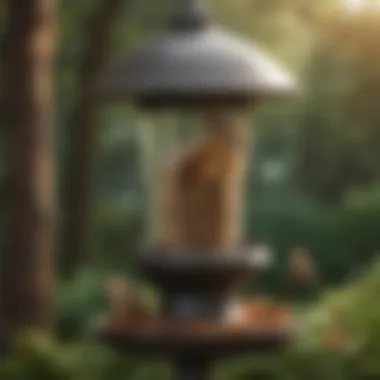

Remember: Even a few mindful changes can make your garden feel less welcoming to squirrels. By maintaining a little space and adjusting trees, you mitigate the comforts that draw them in.
Ultimately, modifying the habitat around your garden isn’t just about expelling squirrels; it’s about creating a more balanced relationship with nature. A garden that repels squirrels can also benefit other wildlife, which can lead to a more vibrant ecosystem overall.
Utilizing Decoys: Psychological Deterrents
Keeping squirrels at bay can sometimes take a bit of creativity. One innovative approach is to use decoys that leverage the psychological element of fear. When you think like a squirrel, it becomes easier to understand what might spook them. By employing various types of decoys, you can create a garden ambiance that makes squirrels feel unwelcome. This method not only proves effective but is also relatively low-maintenance compared to other preventative strategies.
Using decoys can turn your garden into a less appealing spot for squirrels, effectively reducing their visits.
Predator Models to Scare Away Squirrels
One popular tactic involves placing predator models in your garden. These can range from realistic-looking statues of hawks, owls, or even cats, as these animals are natural predators of squirrels. The sight of such models can trigger an instinctual fear, making squirrels think twice before approaching your plants.
However, it’s important to consider placement and variety. If you just set up one lone owl statue, squirrels might become accustomed to it after a while. To keep them on their toes, you might want to regularly rotate the location of these models or even change them out for different types like hawks and cats. The unpredictability can help maintain the element of surprise.
Implementing these predator models does require some upfront investment, depending on the quality you're aiming for. You can find everything from dollar store versions to high-quality replicas that mimic real birds of prey. While the cheap options won't empty your pockets, the pricier ones may come with realistic movements that can enhance effectiveness.
Sound and Motion Deterrents
Another engaging strategy is the use of sound and motion deterrents. These gadgets function by emitting sounds that mimic the calls of predators or triggering noise when squirrels approach. Voice-activated devices or motion-sensing speakers can create an audio experience that squirrels find unsettling.
You could opt for devices that play recordings of howling winds or predator calls. Moreover, it’s key to use such deterrents wisely. If placed incorrectly or used constantly, squirrels might simply adjust to the noise, rendering it ineffective. To counteract this, consider options that vary their sound or have inconsistent timing—this way, squirrels can’t predict when the disruptive noise will occur.
While these devices may require batteries or an electric source, they often come with added benefits, like entertainment for your guests or insights into the wildlife interactions in your garden.
In wrapping this section, utilizing decoys as psychological deterrents can be an effective way to make your garden a less appealing place for squirrels. Beyond mere aesthetics, these strategies tap into the natural instincts of these critters, often yielding successful results in keeping them away from your cherished plants.
Monitoring and Adjusting Strategies
In the world of gardening, keeping squirrels at bay is akin to playing a strategic game of chess. One wrong move, and they might just snag your prized vegetables and flowers. This section emphasizes the necessity of monitoring and adjusting your strategies to prevent squirrels from intruding on your garden. Not only does it involve watching the activity around your plants, but it's also about being flexible enough to change your methods as needed. This dynamic approach can save your plants and ultimately enhance the enjoyment of your outdoor space.
Keeping Track of Squirrel Activity
First things first, paying attention to squirrel movements becomes paramount. A keen eye can provide you hints on when and where they strike. Consider doing a daily walk around your garden, coffee in hand, just observing the comings and goings of these critters. Here are a few things to keep in mind:
- Time of Day: Squirrels are usually more active in early morning and late afternoon. Take note of when you see them near your garden.
- Specific Areas: Identify the favorite spots they frequent. Are they drawn to bird feeders nearby? Or maybe a specific plant that catches their eye?
Using a journal can help catalog your observations. Simple notes on dates and times can reveal patterns in their behavior. This can lead to better strategies in the long run. Because let’s face it, a proactive approach is always better than a reactive one!
Refining Deterrent Methods Based on Results
After monitoring the squirrels for a while, the next step is to refine your deterrent methods. What works for one garden may not work for another; every garden has its own personality, just like the gardeners who tend to them. Based on your observations, you might find that certain methods necessitate tweaking.
Here’s how you can improve your strategies:
- Evaluate Effectiveness: If a repellent spray seems to lose its magic, consider either increasing the concentration or switching to different ingredients. Solutions like chili pepper spray might work one week, but less so the next.
- Adjust Placement: Are fig plants particularly vulnerable? Position your barriers around them instead to provide extra protection where it’s needed most.
- Monitor Weather Changes: Remember that rain can wash away repellents or change the scents in your garden that may attract or repel squirrels. Adjust your methods according to the weather forecast; it’s all part of the game!
In summary, keeping a close watch on squirrel activity combined with a flexible mentality regarding deterrence is crucial. As gardens grow, so do squirrel tactics, thus requiring a strategic mind to adapt and evolve your methods.
"The best laid plans of mice and men often go awry"—and so, too, can our carefully curated gardens if we do not pay attention to the small details.
Long-term Strategies for Sustained Success
When it comes to the ongoing battle against squirrels invading our gardens, developing long-term strategies is the name of the game. It’s about not just fighting fires, but also preventing them from sparking up in the first place. A sustainable approach ensures that your garden thrives without constant interruptions from our bushy-tailed friends. This section explores some key aspects that can lead to a squirrel-free garden environment in the long haul.
Establishing a Healthy Garden Environment
A flourishing garden is not only pleasing to the eye, but also serves as a form of natural defense against uninvited guests like squirrels. To begin with, you need to focus on healthy plants. Strong, mature plants can better withhold any nibbling adventures. Ensuring that your plants are well-watered, properly spaced, and receiving the necessary nutrients can transform your garden into a thriving ecosystem.
Moreover, it’s pivotal to reduce reliance on annuals that require constant replanting. Perennials, for instance, can provide a solid structure in your garden, making it less favorable for squirrels. Additionally, opting for native species can naturally reduce the chances of attracting squirrels, as these plants might not align with their foraging habits.
Consider implementing companion planting too, where certain plants are placed close together to benefit each other. For example, some aromatic herbs can deter squirrels while also enhancing the health of neighboring plants.
To sum up, a healthy garden environment creates an ecosystem where plants thrive and deter squirrels. A well-balanced habitat doesn’t just involve planting, but also ensuring that the soil is rich, water is abundant, and pests are controlled effectively.
Involving Community Efforts in Deterrent Plans
Gardening isn’t always a solo endeavor; believe it or not, your neighbors can be your best allies in keeping those pesky squirrels at bay. Community efforts can amplify your ability to ward off squirrels. Initiating local gardening groups or community gardens creates a collective voice against these critters.
Getting together with fellow garden enthusiasts can lead to shared knowledge on effective deterrent methods that have worked in your area. For instance, sharing tips about what plants seem unappealing to these rodents, or discussing successful physical barriers can provide a treasure trove of information unavailable via just solitary research.
Moreover, organizing community events can help draw attention to local wildlife issues. Events like neighborhood clean-ups can play a role in removing food sources that draw squirrels into gardens in the first place. When communities come together, gardening troubles can be tackled without overwhelming individual gardeners.
"A community that gardens together can grow stronger together, cultivating not just plants, but friendships as well."
In the long haul, involving community efforts creates a synergistic atmosphere where everyone benefits. As knowledge and resources are shared, both your plants and your gardens stand a better chance against any squirrel invasions.







